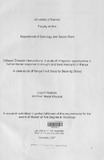| dc.description.abstract | This study established the causes of delayed disaster interventions by exploring the
works and processes of drought response and food insecurity management by KFSSG
and determined the available opportunities in humanitarian response to the same.
The study was aimed at addressing delays in disaster response in Kenya, a situation
that resulted to loss of lives and livelihood. The 2005-06 famine is estimated to have
. caused Kenya Ksh. 450 million that would have been otherwise used for development
had proper mitigation and preparedness efforts put in place. The study focused on the
activities of the Kenya Food Security Steering Group (KFSSG) based in Nairobi, and
whose mandate involved drought and food security management.
The goal of the study was to establish causal factors underlying delayed intervention
against drought related disasters in Kenya, as well recommend mitigation measures
against loss of human lives and human suffering
The research reviewed the chaos and coping theory. Chaos theory attempts to explain
how disaster occurs while coping theory explain how communities cope with disruptions
in the system.
The study covered the work of 40 agencies, all members of KFSSG. To collect the
desired data, the research utilized questionnaires observation and data review. A key
informant guide was used to gather information fr~m key officials in the group. This
guide contained open ended questions that allowed further probing of relevant
information.
Data gathered was coded according to commonality of themes and analyzed using
percentages, frequencies and modes.
The research found out that over the last year, there has been increased funding
towards drought management and food security projects. However, decision of funding
was ad hoc and most organizations did not access funds for preparedness.
It was also revealed that there was policy gaps in the country as far as drought and food
insecurity are concerned. Due to lack of policy in funding, the study revealed that there
lacked substantial plans on the future of drought management and food security, a
situation that threatened the sustainability of currently ongoing efforts. •
There were no apparently proper contingency plans in the event that Kenya experienced
a major drought and food insecurity. Deficiencies in programming and funding stated
herein were attributed to the delays in humanitarian responses to drought and food
insecurity.
In conclusion, the research find out that though there are improved efforts in the area of
humanitarian response to food insecurity and drought management, there were still
hindrances to the process that threatened lives and livelihoods.
As a result, the study highly recommends review of programming of drought and food
security projects, increased funding and capacity building of the community living in
drought prone zones. The study further recommends review of policy and research in
viable livelihood options within the Arid and Semi Arid regions. | en |

